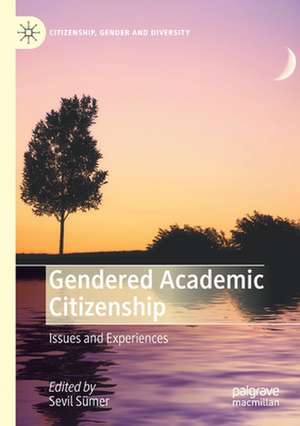Gendered Academic Citizenship: Issues and Experiences: Citizenship, Gender and Diversity
Editat de Sevil Sümeren Limba Engleză Paperback – oct 2021
This book will be of interest to academic researchers and students at all levels in the disciplines of sociology, gender studies, higher education, political science and cultural anthropology.
| Toate formatele și edițiile | Preț | Express |
|---|---|---|
| Paperback (1) | 638.24 lei 43-57 zile | |
| Springer International Publishing – oct 2021 | 638.24 lei 43-57 zile | |
| Hardback (1) | 642.51 lei 43-57 zile | |
| Springer International Publishing – 30 sep 2020 | 642.51 lei 43-57 zile |
Preț: 638.24 lei
Preț vechi: 750.88 lei
-15% Nou
Puncte Express: 957
Preț estimativ în valută:
122.12€ • 127.85$ • 101.05£
122.12€ • 127.85$ • 101.05£
Carte tipărită la comandă
Livrare economică 07-21 aprilie
Preluare comenzi: 021 569.72.76
Specificații
ISBN-13: 9783030526023
ISBN-10: 303052602X
Pagini: 250
Ilustrații: XIX, 250 p. 5 illus.
Dimensiuni: 148 x 210 mm
Greutate: 0.36 kg
Ediția:1st ed. 2020
Editura: Springer International Publishing
Colecția Palgrave Macmillan
Seria Citizenship, Gender and Diversity
Locul publicării:Cham, Switzerland
ISBN-10: 303052602X
Pagini: 250
Ilustrații: XIX, 250 p. 5 illus.
Dimensiuni: 148 x 210 mm
Greutate: 0.36 kg
Ediția:1st ed. 2020
Editura: Springer International Publishing
Colecția Palgrave Macmillan
Seria Citizenship, Gender and Diversity
Locul publicării:Cham, Switzerland
Cuprins
1. The Contours of Gendered Academic Citizenship Sümer, O’Connor and Le Feuvre.- 2. Accessing Academic Citizenship: Excellence or Micropolitical Practices? O’Connor.- 3. Probationary or Second-class Citizens? Postdoctoral Experiences in the Swiss Context Le Feuvre, Bataille, and Marie Sautier.- 4. Gender and Academic Citizenship Practices: The Norwegian Case Brandser and Sümer.- 5. Family, Career Progression and Gendered Academic Citizenship Tan, Sağlamer, Çağlayan.- 6. Changing Institutional Policies and Gender Equality Challenges: The Hungarian Case Judit Lannert and Beáta Nagy.- 7 Sexual Harassment in Turkish Academia through the Lens of Gendered Academic Citizenship Ecevit and Beşpınar.- 8. Conclusions: Gendered Academic Citizenship as a Promising Agenda Sümer, O’Connor and Le Feuvre.
Notă biografică
Sevil Sümer is Associate Professor of Sociology, University of Bergen. She was the Scientific Coordinator of the EU-funded project FEMCIT: Gendered Citizenship in Multicultural Europe. Sümer is the author of European Gender Regimes and Policies and has published extensively on gender, inequality, citizenship and work-family policies in international journals.
Contributors: PAT O’CONNOR, University of Limerick, Ireland; NICKY LE FEUVRE, MARIE SAUTIE, University of Lausanne, Switzerland; PIERRE BATAILLE, University of Grenoble, France; GRY BRANDSER, Nord University, Norway; MINE G. TAN, GÜLSÜN SAĞLAMER, HÜLYA ÇAĞLAYAN, Istanbul Technical University, Turkey; JUDIT LANNERT, T-Tudok Centre for Knowledge Management and Educational Research, Hungary; BEATA NAGY, Corvinus University of Budapest, Hungary; YILDIZ ECEVIT, FATMA UMUT BEŞPINAR, Middle East Technical University, Turkey
Contributors: PAT O’CONNOR, University of Limerick, Ireland; NICKY LE FEUVRE, MARIE SAUTIE, University of Lausanne, Switzerland; PIERRE BATAILLE, University of Grenoble, France; GRY BRANDSER, Nord University, Norway; MINE G. TAN, GÜLSÜN SAĞLAMER, HÜLYA ÇAĞLAYAN, Istanbul Technical University, Turkey; JUDIT LANNERT, T-Tudok Centre for Knowledge Management and Educational Research, Hungary; BEATA NAGY, Corvinus University of Budapest, Hungary; YILDIZ ECEVIT, FATMA UMUT BEŞPINAR, Middle East Technical University, Turkey
Textul de pe ultima copertă
This book proposes the framework of gendered academic citizenship to capture the multidimensional and complex dynamics of power relations and everyday practices in the contemporary context of academic capitalism. The book proposes an innovative definition of academic citizenship as involving three key components: membership, recognition and belonging. Based on new empirical data, it identifies four ideal-types of academic citizenship: full, limited, transitional citizenship and non-citizenship. The different chapters of the book provide comprehensive reviews of the relevant research literature and offer original insights into the patterns of gender inequalities and practices of gendered academic citizenship across and within different national contexts. The book concludes by setting a comprehensive research agenda for the future.
This book will be of interest to academic researchers and students at all the levels in the disciplines of sociology, gender studies, higher education, political science and cultural anthropology.
This book will be of interest to academic researchers and students at all the levels in the disciplines of sociology, gender studies, higher education, political science and cultural anthropology.
Caracteristici
Provides a gendered analysis and conceptualization of academic citizenship Examines the current neoliberal constraints facing academia and higher education Builds on insights from FEMCIT















